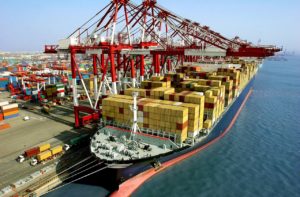The world is a global village and driven by knowledge and multiple inventions, it is moving at a fast pace. While some countries are going forward with the trend of events, some are going backwards and others are stagnant. A country that is stationary at this time is a disaster waiting to happen. One common denominator however is that each country is going through one challenge or the other.
While the maritime industry is passing through global challenges, it does not diminish the fact that it is a critical sector in the economy of any nation. In the midst of scarce resources and qualified manpower, some countries have taken the bull by the horns by investing in areas of comparative advantage especially when they realised that the industry has what it takes to turn around the economy of a country. But while each nation struggles for larger share in the international market space, there are head on collisions, which raises global concerns. For instance experts talk about excess shipbuilding capacity in almost all the shipbuilding centres of the world including China and South Korea that recently have been acknowledged as the topmost two ship building nations in the world ahead of Europe.
Before now, it may not have mattered much but the fall in the price of crude oil has also affected the demand for new vessels and platforms. Funding of new ship facilities is a big challenge as return on investment has been slow. Competition for new projects is so strong between China, Korea and Singapore on one hand and the West on the other hand. There is also a serious gap in skilled professionals, which ordinarily the developing countries should taken advantage of. This is in spite of the fact that China alone employs more than 34 million people in the maritime sector, yet China does not have enough trained personnel to handle the industry.
In Africa, the horizon does not look very promising although this does not remove the fact that some countries are making great effort at transforming the sector considered as the next big thing to happen. In most African countries, there are no new shipyards established in the last one year, vessels demand is not in tandem with expected trend mostly due to low price of crude oil and low investment in the oil and gas sector. Export, which is expected to boom, has not grown in geometric progression. Africa thus has not maximized the benefit of excess capacity and low demand of vessels in Europe and Asia which could have seen a shift to Africa to handle the effect of competition.
But where does Nigeria stand in in this interplay of forces? Without the help of a soothsayer, it is obvious that new unpredictable foreign exchange regime appears to ground investment in the maritime sector by making it unattractive. Slide in price of crude oil which is the main driver of maritime growth in Nigeria has not helped matters. Insecurity and piracy has contributed to affect low vessel traffic in the Gulf of Guinea. Excess charges and multiple charges are also having negative impact in both import and export. Poor ports access roads have further complicated the matter. The country does not have a national fleet which weighs the balance of trade and cargo against her.
In this global challenge, experts have severally noted that Nigeria’s only natural area of strength in skilled manpower is highly underdeveloped, consequently, the country has not taken advantage of its geographical location to affirm itself as a maritime hub.
However it is good to underline the effort of the federal Ministry of Transportation in driving the national fleet project through the private sector. This will help to address the gap in training needs of young cadets, employment opportunities that abound and restore the dignity of Nigeria in the comity of maritime nations, without draining scarce government resources.
Some of the agencies in the maritime sector have come out specifically to talk about building capacity. Nigerian Maritime Administration and Safety Agency (NIMASA) Director General, Dakuku Peterside recently reiterated the commitment of the agency to the development of maritime capacity through the National Seafarers Development Programme (NSDP). The NSDP was specially designed to encourage youths to pick up careers at sea as a result of the ageing crop of Nigerian seafarers. The youths without doubt should take more interest in the opportunities in the industry as the sector provides great prospects for employment generation and wealth creation.
We are of the opinion that the era of pontificating must be dispensed with. Now is the time for government to begin aggressive knowledge and skills building in the industry in order to effectively harness its potentials.
Copyright Ships & Ports Ltd. Permission to use quotations from this article is granted subject to appropriate credit given to www.shipsandports.com.ng as the source.
